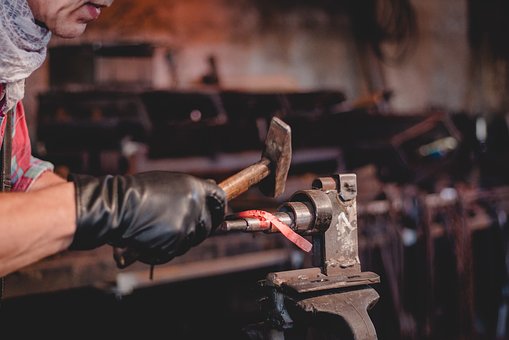You might have heard people throw around the term ironsmith in a similar context to the word blacksmith. But what does it mean, and what’s the difference between the two?
What’s the difference between a blacksmith and an ironsmith? There’s no real difference between the two. They are essentially synonyms. Both of them are people who work with metals, primarily iron.
In this article I’ll discuss blacksmiths, ironsmiths, and other types of smiths as well.
Blacksmith vs. Ironsmith
Iron is sometimes called a black metal because of the appearance that it takes on while it’s being worked.
A smith is somebody who works with metal.
So an ironsmith and a blacksmith describe basically the same thing.
It’s sort of like wrought iron vs. wraught iron… it’s just a different name for the same thing.
You could argue that “blacksmith” is a bit more broad of a term. That’s because they might work with steel and other types of metal besides just iron.
To say you’re an ironsmith is further specializing and saying to the world that you exclusively work with iron.
As a business, that could really pigeon-hole you and limit the types of work that you could do without having to change your name. Even if you exclusively work with iron today, you might want to branch out into working with copper, bronze, and other kinds of metals in the future.
Plus the term ironsmith isn’t commonly used in modern times. If you type ironsmith into Google it comes up with 1.1 million results. But if you type in blacksmith, you get about 64 million results! So blacksmith is clearly the more popular and widely used term.
Related Questions
Are There Any Other Types of Smiths?
Yes, there are a bunch of other kinds of smiths as well!
There’s silversmiths and goldsmiths who focus on crafting things like jewelry from precious metals.
There are whitesmiths or tinsmiths who make or repair things that are made of tin.
And there are coppersmiths who make things from copper. They’re sometimes also called redsmiths since copper has a reddish color to it.
There are other smiths like locksmiths, bladesmiths and gunsmiths as well. While they work with metal like a blacksmith does, but they often focus on only making one object.
A bladesmith makes knives and other kinds of blades. And a locksmith traditionally works with locks.
The word smith is sometimes applied to other careers that don’t even deal with metal. For example, writers are sometimes called wordsmiths!
Why Is There A Need To Specify? Why Not Just Call Everyone Blacksmiths?
The problem with calling everyone a blacksmith would be that it would be hard to find experts for specific metalworking tasks.
Not all blacksmiths have the knowledge and experience needed to make great blades, and very few would have the ability to make things out of other metals besides iron and steel.
Working with gold and silver is very different from working with steel or iron. It’s often very intricate and detailed work that’s done on a small scale.
It’s a far step away from a blacksmith banging on a solid chunk of iron with a sledgehammer. Plus gold and silver have different melting points and other properties that make them very different to work with than steel or iron.
Think about it. If something is happening with your heart, you probably don’t want to just visit a general doctor. You’re going to want to get referred to a cardiologist.
Different kinds of smiths are metalwork specialists in the same way that a doctor specializes in a specific type of healthcare.
If you specifically want something made of copper, you’re best off going to a coppersmith. If you need something made of tin, a whitesmith is your best choice.


